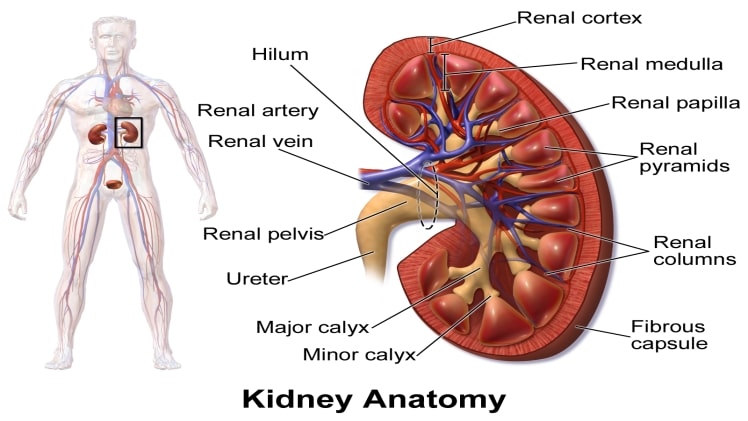Kidneys are responsible for removing wastes and excess fluids from the body. They maintain a healthy balance of electrolytes such as sodium, calcium, and potassium in the body. They filter the blood and remove excesses of each. After filtration, the blood is returned to circulation inside the body and the waste is excreted as urine through the bladder. Chronic kidney disease (CKD) refers to kidneys that are damaged and cannot properly filter the blood.
Common causes of CKD are diabetes and hypertension or high blood pressure. Other causes can include genetic disorders, exposure to toxins, infections, and many other things. Early on, there are usually no symptoms of kidney disease. When symptoms do begin, they may include less overall urine output, swelling in hands or feet or feeling short of breath, confused, and/or fatigued.
Diagnosis of Chronic Kidney Disease
Kidney disease is often an incidental finding when lab tests are done on the blood or urine due to some other illness. For example, protein or blood might be found in the urine when a patient has a suspected urinary tract infection. This is an indicator of disease because normal, non-diseased kidneys should filter protein and blood and send it back into the bloodstream rather than out in the urine. Another finding might be elevated creatinine in the bloodstream. Creatinine is a substance normally found in the blood due to daily activity using muscles. It comes from normal muscle breakdown and repair. However, if the amount of creatinine in the blood is too high, this indicates that the kidneys are not excreting it appropriately and something is wrong.
Kidney Biopsy
If an obvious cause for kidney disease cannot be found, a doctor may recommend a kidney biopsy to diagnose the exact problem. Kidney biopsies can show exactly what part of the kidney has a problem and can help guide treatment of kidney disease. They are generally done in a hospital under light sedation. The procedure usually involves inserting a needle through the skin on a patient’s back and into a kidney to withdraw a tiny piece of kidney tissue. This is a fairly minor procedure but there are some potential complications such as bleeding and potential for infection. To avoid bleeding, doctors may request that before biopsy patients should stop taking medications that interfere with blood’s ability to clot such as aspirin and over-the-counter NSAID pain medications.
Just before the biopsy, an IV will usually be placed to administer fluid and medications including those used for sedation during the procedure. Most people will lay face down with a sandbag or pillow under the abdomen. This helps to compress the abdomen and push the kidneys towards the back so it is easier for the needle to reach them. People with transplanted kidneys often lie face up though because transplanted kidneys are usually placed towards the front part of the abdomen. At this time, a nurse will administer medications to help prevent the patient from feeling pain and to make them feel sleepy. A physician may use a device such as an ultrasound machine to help find the exact location of the kidney so they know where to place the needle. They usually ask the patient to hold their breath if possible when the needle is inserted to avoid the kidney moving.
After a kidney biopsy, a patient may be placed on bedrest for a short time or expected to stay in the hospital under observation for about 12-24 hours. It is also advisable to wait about 2 weeks before resuming any strenuous exercise or activity. The physician may wish to evaluate a urine sample to determine if there is bleeding inside the kidney. There may also be blood tests such as a complete blood count which looks for many types of blood cells and may indicate if a patient is bleeding internally.
A kidney biopsy might help to diagnose the cause of kidney disease and help to determine appropriate treatment. Kidney biopsies are also often done on transplanted kidneys to assess if the body might be rejecting the donated organ. The biopsied tissue is evaluated under a microscope by a pathologist. It might show unusual inflammation, infection, scarring, cancer, or deposits of a protein called immunoglobulin. If the kidney is transplanted, the biopsy may show the pathologist why it is not functioning as expected.
After a kidney biopsy, it is very important to call a doctor if a patient has any of the following symptoms:
- Significant blood in urine or urine that looks dark red/brown. However, it is normal for urine to appear slightly cloudy or pink for about 1 day following the procedure.
- blood from the biopsy site if there is enough to soak a bandage
- pus coming from the biopsy site
- increased pain at the biopsy site
- feelings of dizziness or fainting
- fever
- frequent/urgent needs to urinate or burning when urinating

